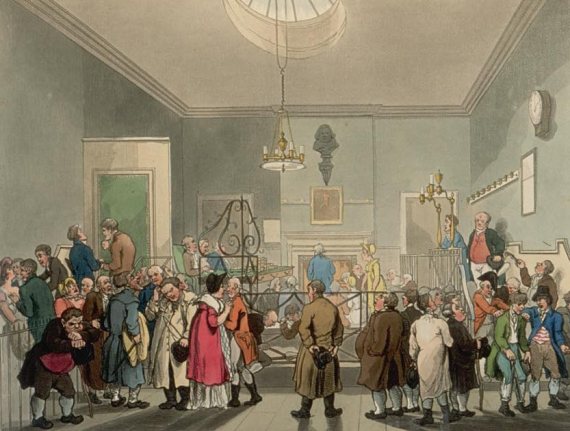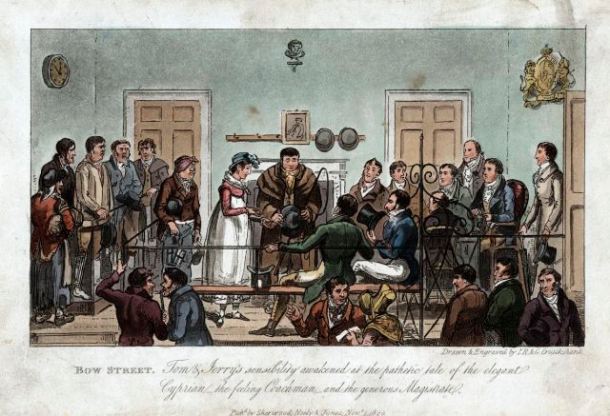Crime and Punishment, no I’ve not read it (not yet!), but I was thinking about this topic recently. The Metropolitan Police force was created in 1829 to prevent crimes and find criminals, but what was there before this? In the 1800s London was a city of over half a million people. Throughout the century wars were beginning and ending resulting in lots of unemployed, disillusioned men in the city. Due to the Gin Craze many of those on the streets were drunk and incapable. There was no real police force, watches were organized by parish and were often disorganised and feeble. People were frightened of violent criminals and street gangs so often looked the other way on serious crimes.
However, half way through the century a couple of brothers begun to change everything and policing in England has never looked back.

A 19th century depiction of the courtroom at 4 Bow Street
Who?
This dynamic duo was Henry Fielding (yes, the novelist) and his half-brother John Fielding. Henry was appointed to the Bow Street Court Justice in 1748, as a magistrate and begun making changes. John Fielding took over when his brother died.


What?
Henry Fielding founded the Bow Street Runners, named after the location of the court. Essentially, this was the beginning of the professionalization of the police. The Bow Street Runners were also known as ‘Mr Fielding’s people’.
Why?
Henry Fielding started the Bow Street Runners in 1749 after a post-war crime wave and amidst worries that not enough criminals were being convicted.
Before the Bow Street Runners London was served by Watches which were organised by parishes. Constables were chosen randomly from the parish and were meant to serve for one year. Often people paid deputies to carry out their duties for them. These constables and their men were meant to patrol the streets, collect pickpockets and vagrants and those guilty of ‘loose, idle and disorderly conduct’. They received payments for handing people in. They were often ineffective and corrupt.
The Fieldings believed that crime was based in an understanding of its causes. They thought that these causes were things like the ineffectiveness of the Poor Law, the impunity of receivers of stolen goods, a backwardness in apprehending and prosecuting criminals, a fear of offenders and costs, a difficulty in obtaining evidence, and the number of pardons from the death penalty.
How?
So how did their new system work? Fielding paid a retainer to constables and ex-constables to find and arrest serious offenders. Fielding hoped that his oversight, and a permanent ‘wage’, would avoid the men becoming corrupt.
The government gave £200 per year (a male textile worker would earn about £14) to Fielding; the Bow Street Justice was the only one to receive a stipend to go towards a permanent force. This actually didn’t stretch that far and runners often had to rely on the rewards given by the government and payments from victims who hired them.
Fielding advertised in newspapers, encouraging people to send word to Bow Street as soon as a crime was committed, such as a theft, so a ‘set of brave fellows’ could be dispatched.
Henry Fielding also began a newspaper called The Covent Journal. The following advertisement appeared regularly in the journal:
All persons who shall for the future suffer by robbers, burglars, etc., are desired immediately to bring or send the best description they can of such robbers, etc., with the time, and place, and circumstances of the fact, to Henry Fielding, Esq., at his house in Bow Street.
All this activity was supervised by the examining magistrate (Henry then John Fielding) who would build the prosecution for trial at the Old Bailey.
When John Fielding took over, he continued his brother’s work with many of his own innovations. He:
- Established Bow Street as a central collection point for information about serious crimes
- Started an alphabetical register of crimes and prosecutions
- Made the Bow Street Runners patrol major streets and principal roads leading in to London to dissuade pickpockets and highway men
- Published descriptions of criminals and stolen goods
- Increased crime reporting
- Encouraged the cooperation of pawnbrokers
- Publicised laws
- Communicated the successes of the Bow Street Runners
In 1763 Lord Harrington’s house was robbed of £3000 pounds of jewels and silver. He called in the Bow Street Runners and John Fielding spent time investigating the crime. He determined it was an inside job and accused a servant who later confessed. This kind of detective work, and successful prosecutions was one of the thing Bow Street became known for.8
Did it work?
In the long-run – absolutely. In many ways, the Bow Street Runners can be seen as the advent of modern policing. It was also pretty successful in the short term.
There was some evidence Henry Fielding tolerated corrupt thief-takers. These men were often despised by the poor and vulnerable because they were known to set up innocent people in order to collect the reward for a crime. Fielding wasn’t suspected of colluding with corrupt constables but, at the beginning, his men were not above suspicion. However, ‘Fielding’s people’ quickly gained respectability through their few years of operation. By the late 18th century the Bow Street runners were essentially full-time policemen.
The public thought they were efficient because they successfully prosecuted more offenders than any other magistrates in London. The fact that they received a stipend insulated them from claims that they, specifically the Fielding brothers, lived off the fees they collected from those who appeared in court. They were also sure to advertise their successes to increase the number of people who called on their help and to increase the public’s confidence in them.
In 1792 the Middlesex Justices Act created offices on the model of Bow Street across London and a few decades later, in 1829, the Metropolitan Police was created.
Oh, and did I mention that John Fielding was blind and knew the voices of 3000 criminals by heart? Pretty impressive siblings if you ask me!

References
London Lives, 1690-1800, Tim Hitchcock, Robert Shoemaker, Sharon Howard, and Jamie McLaughin, et. al., London (April 2012), www.londonlives.org, version 1.1.
Justice Henry Fielding’s Influence on Law and Literature, Claudia L. Maria-Julia Boros, (2010), Xlibris.
‘The Blind Beak of Bow Street’, Josh Dashney, nfb.org.
‘The Fielding Method of Detection’, A. Giovanopoulos, Sites of Discourse, Public and Private Spheres, Legal Culture, ed. U. Boker
Have you read Fielding’s Enquiry into the Causes of the Late Increase of Robbers? It was written around the time he set up the Bow Street Runners, and provides a remarkable insight into how he viewed the crime and the poor.
LikeLike
No I haven’t but I really want to. Obviously it came up when I was doing a bit of research for this post. I don’t have library access atm so might try and have a look when I start my masters in September. Thanks for the recommendation.
LikeLiked by 1 person
Yeah, it’s a little obscure, but definitely worth it if you are interested in this topic.
LikeLiked by 1 person
Have you read Fielding’s Enquiry into the Causes of the Late Increase of Robbers? It is an excellent insight into his views on the law, crime and most especially the poor.
LikeLike